
How Businesses Can Manage Food Waste
Food waste in the UK has been in the spotlight since an agreement for businesses to help lower the staggering figures on wasted food. The initial three year trial from 2012 to 2015 yielded good results for those involved, but more can still be done.
Household food waste is extremely high, but food in the hospitality industry takes into account the food which is not sold, which is sent back in a restaurant or which is allowed to go past the best before date – it can even include the scraps on people’s plates at the end of a meal.
Why is food waste bad?
There are a number of reasons why food waste is such a bad thing. Just think of all it takes to produce that food; the time, energy and precious resources which go into its production are all wasted if the food is thrown away.
The other big reason we need to reduce this area of waste is due to the fact it often ends up in landfill. It’s not like other materials, because it rots over time and releases harmful gases into the atmosphere. There are approximately 15m tonnes of food waste produced each year in the UK, which is why we should be taking food waste and its handling far more seriously.

Food Waste Hierarchy
In order for businesses to counteract this loss, it’s important that they implement a strategy. The food waste hierarchy is a great way for businesses in the hospitality industry to tackle food waste without having to change their business.
The government has a dedicated structure it would like companies to adhere to when managing their waste. Logically, the first step to implement as part of a business plan is to only order what is needed, reducing the total amount of waste, but for the waste which can’t be combated in this way, the following is suggested:
- Reduce – Waste not, want not – Possibly one of the easiest ways to deal with our waste problems is to reduce the amount of food we produce on the whole, lowering the amount there is to throw away. More responsible production levels and practices, along with consumers only purchasing what they will use, will inevitably help to reduce food waste across the board.
- Reuse – Get creative – While on the surface, it might seem hard to reuse food waste, everyone can do their bit by using as much of their waste as possible before throwing it out. Composting can be performed to use on gardens, while many leftover ingredients, like chicken bones, can be used to create a broth. There are lots of recipes out there for reusing parts of vegetables we throw away, as well as ways in which you can infuse liquor with citrus fruit peels.
- Anaerobic digestion – While food can’t technically be recycled once past a sell-by date – or if sent back to a kitchen – the process of reusing this waste is a fantastic one. Anaerobic digestion utilises the gas given off by rotting foods when their oxygen levels are restricted. The results of this process yields biogas for use as an energy source, while the leftover materials (digestate) can be used as fertiliser.
- Incineration – This is not necessarily an environmentally friendly way to deal with waste, but burning food waste as a fuel does provide a fractional benefit over landfill, giving off heat and energy from the waste where anaerobic digestion isn’t possible.
- Landfill – The final option when it comes to disposing of food waste. There is no benefit to the environment with this option, as more space is taken up and the food rots, releasing harmful methane gases into the air.
How to deal with food waste
Those operating in the hospitality industry, where food regularly goes to waste, could help the environmental goals of the country by separating food waste from normal, everyday waste.
If there is no dedicated council collection for food waste in the area then don’t panic, Brown Recycling offer dedicated waste collection services for the hospitality industry. By providing you with dedicated bins to meet your requirements, you can then separate out your food waste and avoid sending it to landfill. This is a tidy and efficient solution, giving you peace of mind knowing your waste is being disposed of properly, recovering as much energy as possible.
Households can do their part, too, by only buying the food they will actually eat and reusing leftovers which can still be eaten. Home composting is popular for those with a larger garden too, developing a fertiliser from food waste to use periodically.
Brown Recycling
Facilitating the hospitality industry with dedicated food waste collections, simply contact the professional team here at Brown Recycling to find out how we can help your business become more environmentally friendly when it comes to dealing with food waste.
This website uses cookies to enhance your browsing experience and deliver personalised ads. By clicking “Accept All Cookies”, you agree to the storing of cookies on your device to enhance site navigation, analyse site usage, and assist in our marketing efforts.



